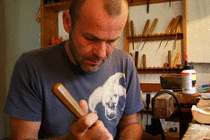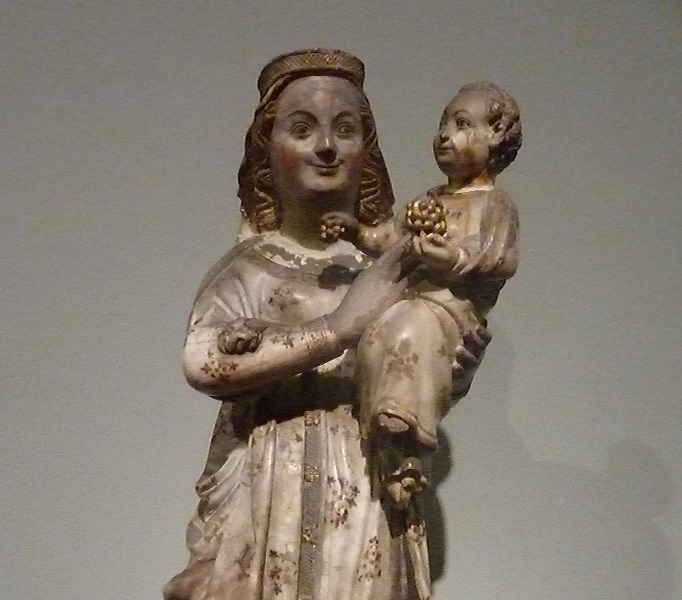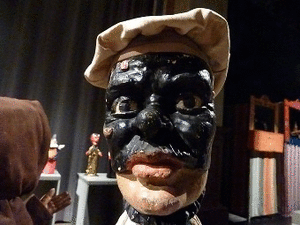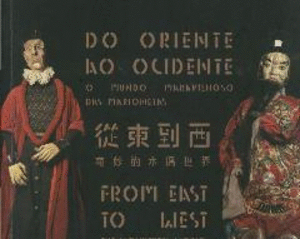Martin Růžička is a carver and marionette builder from Prague, Czech Republic. The accurate work and the quality of crafted wooden puppets made in Prague are well known worldwide, as well as Růžička’s pieces. Martin has not learned his job from tradition, thus this could be the reason of his very personal work. He likes to provoke, to play the role of a post-punk artisan and use a smart sense of humor. He is a self-taught artist —or I should rather say “worker”, as he states making marionettes is just a work for him. However, after talking with him, one can have a clear idea of what this art can be nowadays. Call him a serial artist, but artist in the end, even independent.
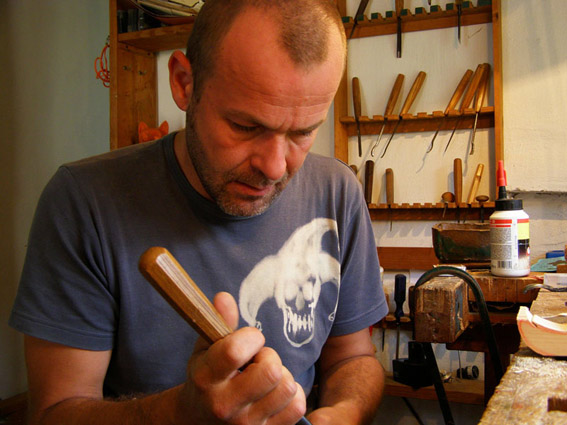
“I studied classical music, but after that I spent eight aimless years in bad companies. I had a lot of fun, but in the end I had to break with all that, and my brother Jan was living in the countryside, building marionettes. He asked me if I wanted to try and I discovered I was good at it, so I started carving puppets professionally.”
“About ten years ago, maybe a little more, I went to Barcelona and stayed there to live for a while. I played guitar in the street and tried to sell marionettes, but it was not easy to make ends meet. I once tried to play for bar customers in terraces, but I felt ashamed and earned little money. I met many puppeteers there, though: I went to Teatre Malic, met Jordi Bertran and Pili from Marionetarium, I also was at the Casa-Taller de Marionetas even if I never knew Pepe Otal personally. I heard about the work of Harry V. Tozer too. Teresa Travieso and I are still in touch, some of my puppets are sold in her shop.” (See interview with Teresa Travieso here, in Catalan, or Marionetas Travi page at Puppetring.)
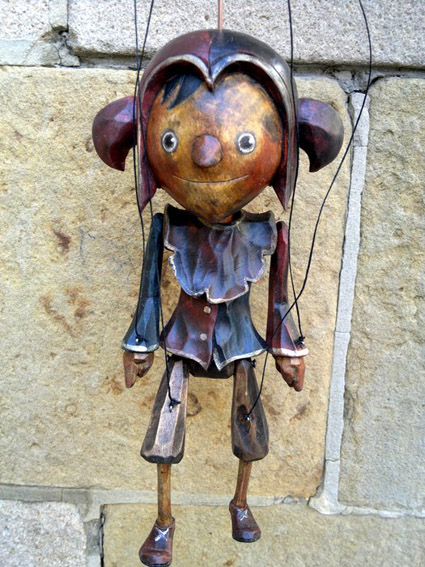
Kasparek.
“It is easier to sell marionettes in Prague. Three different shops sell my figures here. In Prague, it has become a touristic souvenir, so the Don Quixote and Sancho Panza figures that were too expensive in La Rambla even for tourists, in Prague the same type of tourists can request them.”
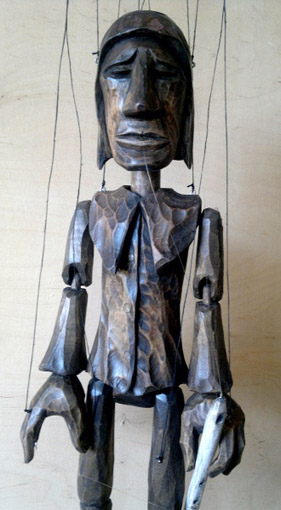
The Piper of Hamelin.
“Now with the economic recession bigger marionettes are no longer being sold. Making a wooden marionette is a lot of work and there’s a point that I can’t lower the prices any further. So people prefer to buy small figures, in particular Americans or Japanese visitors, the ones who used to buy more. Now the Russians and the Chinese come to Prague, but this kind of shopping is not in their culture, so they want to bargain. I have to defend my job, though. Once upon a time I could make whatever at any cost if I was really interested in it, but now I have a family and one assistant, so I don’t work guided by an artistic feeling, but considering myself a handcrafter.”
“I am a little cynic with my own job. Some they say puppets have soul or that the figure exists and is waiting inside the wood to be carved, but all this is a lie. You can do serials of the same thing.”
“Well yes, I have my own puppets company, Teatro Truhla, together with some friends of mine. I also perform with them, but more as a musician (I play in a couple bands too: the Spermbankers and Sketa Fotr.) Teatro Truhla we make ‘westerns’, for example, or ‘science-fiction’ in bars and other uncommon places. Every year for Christmas we perform in a shopping mall in Hong Kong. They pay well and we eat well, the pitty is we can’t use our skeletons or any other dead figure, they want something sweeter. For us everything is ok, it’s a kind of artistic prostitution, but it is also funny. That’s why we do it.”
“We do not make classical puppets, of course, but even in Czech Republic’s tradition the most important thing is the storytelling, so here many companies write and perform their own tales. When I lived in Barcelona, I realized there it is much common the cabaret-based show. It is very different here.”
“Sure! There are some popular characters you can find in many puppet plays. There is Kasparek, this one is very well known, I build lots of Kaspareks. Or Vodnik, the demon from water. Or another one that could be translated as Dumb John, or Lazy John, you never know if he is really dumb or he plays dumb or if he is a lucky dumb or an extremely smart lazy guy. In any case he is a good man and at the end he always wins.”
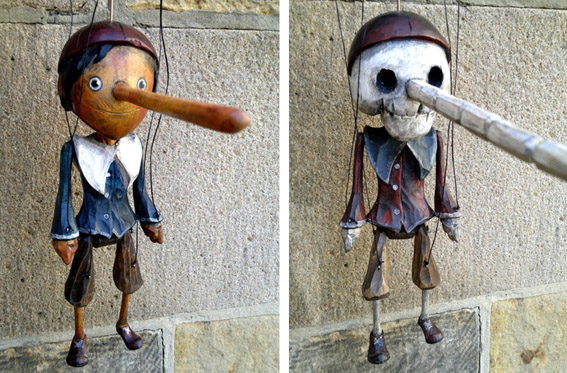
Pinocchio and its dead version (normally preferred by tourists).
“As all Czech carvers, I think, I build my marionettes with linden wood. It is very common here, it’s kind of a national tree. Although, when I make puppets for street performances or bigger figures that require specific movements and more resistant articulations, I make the joints with beech tree wood. But, anyway, the difficult thing to reach in a marionette is the equilibrium.”
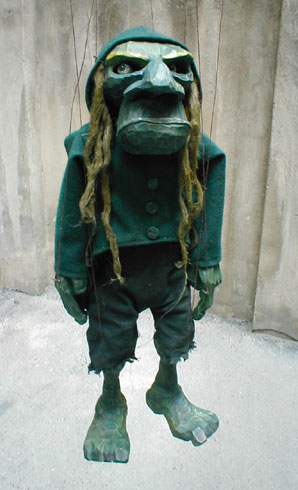
Vodnik.
“I make easy marionettes for Teatro Truhla. But this how it is in Czech Republic: as I told you, here the most important thing is the story, the way to tell it and the imagination, so in general Czech companies do not use complicated marionettes.”
“So yes, I think the golden age of big wooden marionettes is already passed, as it depended mostly on tourism. Czech puppet theatre is very old. Some they say it flourished after the Thirty Years War, in the 17th Century, and in 19th Century, during the Czech national construction, many rich families had their own private puppet theatre at home. But the big wooden statues that were sold as a souvenir from Prague were not exactly a part of this tradition. It was probably a trick. In addition, now in Prague many of these souvenirs are made of chalk and sold by large mafia-behaviour organizations that got the copyright on some figures originally made by local carvers. They are not even Czech. I’m not really worried, though. I don’t think I’ll finish my life being a carver. If I have to, I’ll do something different.”

